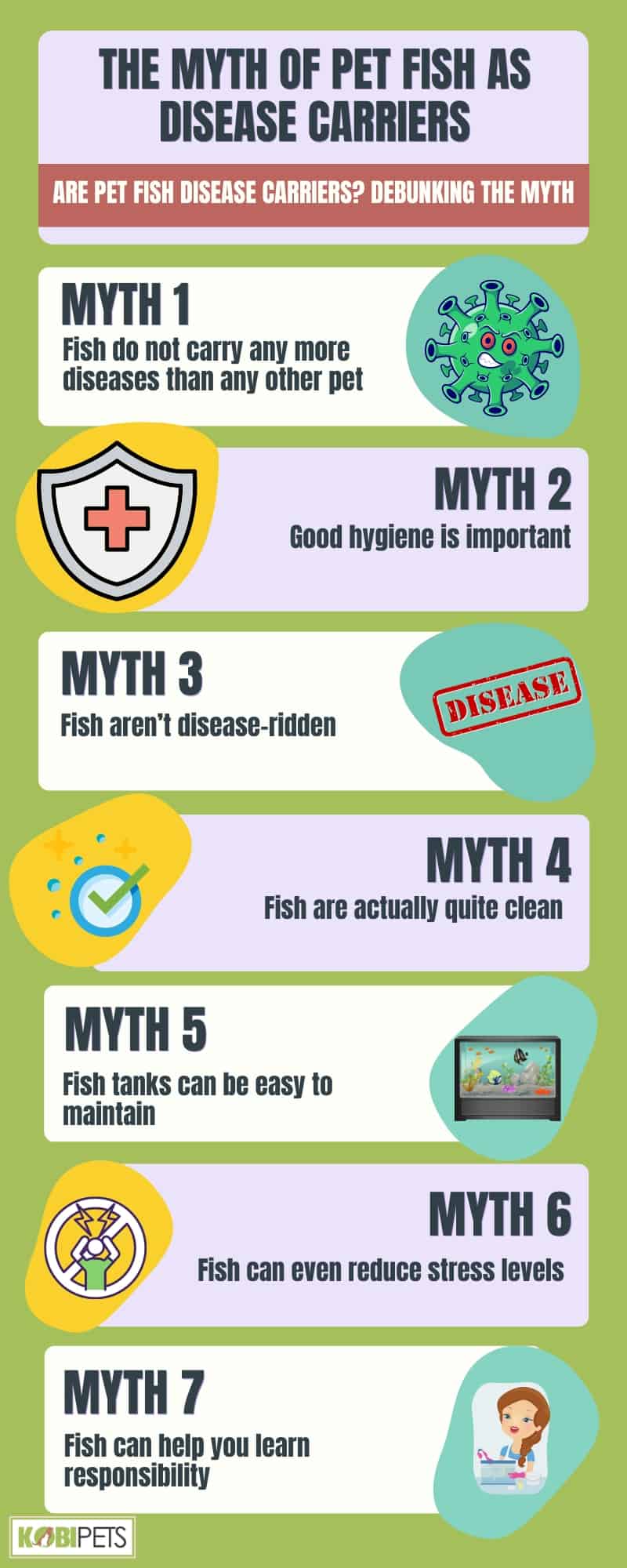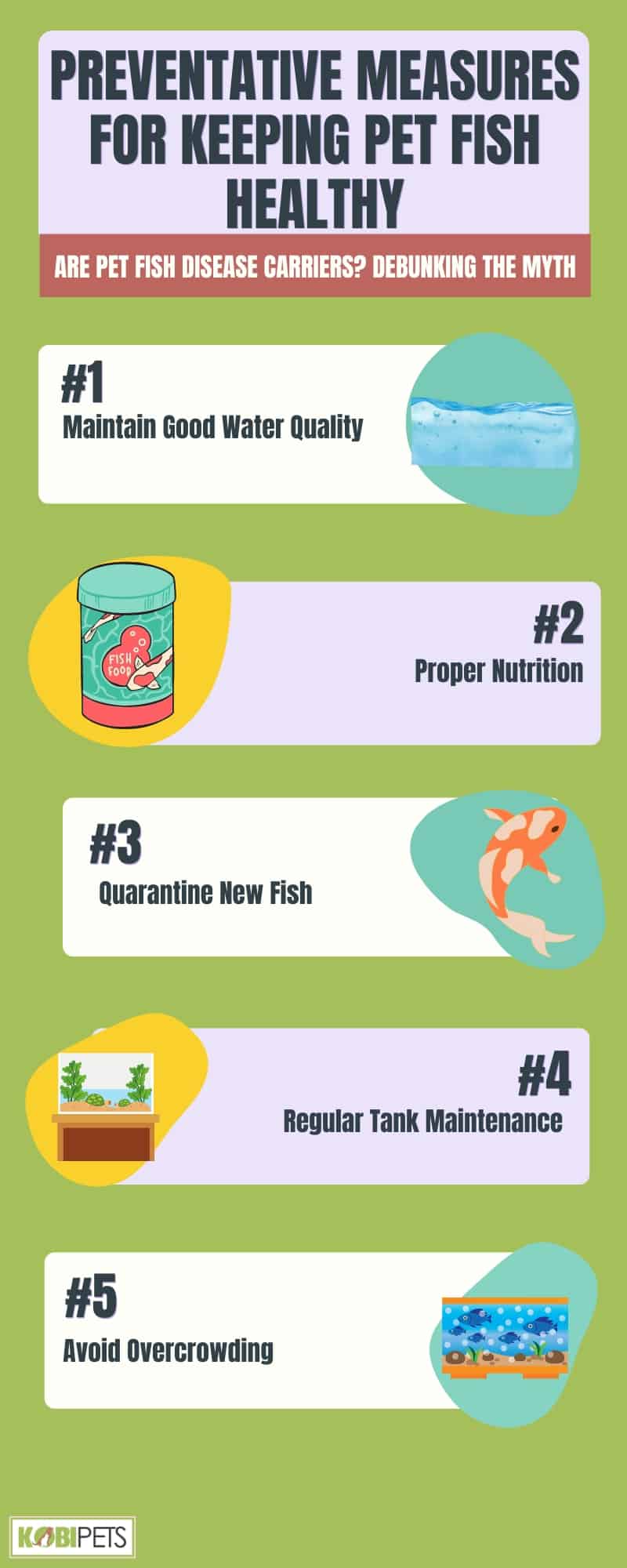
For centuries, humans and animals have been known to be potential carriers of diseases, but it often gets overlooked that pet fish may also unwittingly play a part in spreading illnesses.
Pet fish are not disease carriers by default, but certain factors can contribute to the development of diseases in fish. Maintaining a healthy environment for pet fish through proper water quality, nutrition, and quarantine procedures can prevent the spread of disease and debunk the myth that pet fish are disease carriers.
Through exploring both scientific evidence and real-life user experiences, this post aims to provide factual information about keeping pet fish, so readers can form their own educated opinions on the matter.
The Myth of Pet Fish as Disease Carriers
Did you know that there is a common myth about pet fish as disease carriers? Many people believe that having a fish tank in their homes can lead to the spread of diseases. However, this is actually a misconception.
In reality, pet fish are not known for carrying or transmitting diseases to humans.
While it’s true that some fish may carry harmful bacteria or parasites, these are typically species found in the wild rather than those kept as pets.
Additionally, proper aquarium maintenance and good hygiene practices can greatly reduce the risk of any potential health issues.

The Myth of Pet Fish as Disease Carriers
- Fish do not carry any more diseases than any other pet: Contrary to popular belief, fish actually have a lower risk of transmitting diseases compared to other animals like cats and dogs.
- Good hygiene is important: As with all types of pets, it’s important to practice good hygiene when caring for your fish. This includes making sure that your tank is adequately cleaned and regularly tested for the correct water parameters.
- Fish aren’t disease-ridden: While it can be true that some fish carry parasites or bacterial infections, this is usually rare and easily treated with medication from your local pet store.
- Fish are actually quite clean: Fish are actually quite clean and, like other pets, will often groom themselves to remove any excess dirt or debris that may have accumulated on their fins.
- Fish tanks can be easy to maintain: While there is some effort involved in maintaining a healthy fish tank, it’s not nearly as labor-intensive as keeping other animals. Regular water changes, substrate cleanings, and filter maintenance are all relatively simple tasks that can be done with minimal effort.
- Fish can even reduce stress levels: Studies have shown that having pet fish in the home can help to reduce stress and anxiety levels in both adults and children. Watching your fish swim, feed, or simply lounge about can be quite calming and therapeutic.
- Fish can help you learn responsibility: Taking care of a pet fish is a great way to teach children (and adults) the importance of being responsible for another living creature. Caring for your fish teaches valuable lessons in following instructions, maintaining an environment, and resolving problems quickly.
The Truth About Fish and Disease Transmission
There is a common myth that pet fish are disease carriers and can transmit diseases to humans. However, the truth about fish and disease transmission is more complex than this oversimplified belief.
While it is true that some fish can carry zoonotic diseases that can be transmitted to humans through the consumption of improperly cooked or raw fish, the risk of getting sick from pet fish is very low.
In fact, illness due to keeping fish as pets is rare according to the Centers for Disease Control and Prevention (CDC).
The risk of disease transmission in aquaculture settings, where large numbers of fish are kept in close proximity, is higher. Viral infections can spread quickly in crowded farms, leading to disease outbreaks and death among the fish population.
This can also have implications for wild fish populations if diseases spread from aquaculture sites.
However, there are measures that can be taken to mitigate these risks. For example, freshwater aquaculture practices can be modified to reduce disease spread in wildlife populations.
It’s important to note that not all fish carry diseases and proper care and maintenance of aquariums can greatly reduce the risk of illness.
Regular water changes, appropriate feeding, and quarantine procedures for new additions to an aquarium are all important steps in maintaining healthy pet fish.

Factors That Can Contribute to Fish Disease
Fish, like any other living organism, can be susceptible to diseases. While pet fish are not disease carriers by default, certain factors can contribute to the development of diseases.
Below are some of the common factors that can contribute to fish disease:
- Poor Water Quality: Fish live in water, and the quality of the water in which they live can significantly impact their health. Poor water quality can be caused by a lack of filtration, infrequent water changes, or the accumulation of waste.
- Overcrowding: Overcrowding can increase stress levels and lead to the spread of disease. When there are too many fish in one aquarium, the water quality can also decline rapidly.
- Stress: Fish can become stressed due to various reasons such as aggressive tankmates, insufficient hiding places, and changes in water parameters. Stress can lower the immune system, making the fish more susceptible to disease.
- Poor Nutrition: A balanced and nutritious diet is essential to maintaining the health of pet fish. Poor nutrition can lead to a weakened immune system and increase the risk of disease.

Preventative Measures for Keeping Pet Fish Healthy
Pet fish are a popular choice for many households as they provide companionship and relaxation.
However, there is a common misconception that pet fish are disease carriers.
This is not entirely true, as fish can only transmit diseases to other fish and not to humans. Nevertheless, it is essential to take preventative measures to keep your pet fish healthy.

Preventative Measures for Keeping Pet Fish Healthy
- Maintain Good Water Quality: The most crucial factor in keeping your pet fish healthy is maintaining good water quality. Poor water quality can lead to stress and disease in fish. It is recommended to change 25% of the aquarium water every two weeks.
- Proper Nutrition: Providing your pet fish with proper nutrition is also crucial for their health. Overfeeding can lead to obesity and poor water quality, while underfeeding can cause malnutrition.
- Quarantine New Fish: When introducing new fish into an aquarium, it’s essential to quarantine them first before adding them to the main tank. This will help prevent the spread of any potential diseases.
- Regular Tank Maintenance: Regular tank maintenance includes cleaning the filter, removing debris from the tank, and checking the water parameters regularly.
- Avoid Overcrowding: Overcrowding can lead to poor water quality and stress in fish, which can make them more susceptible to disease.
In conclusion
In conclusion, while it is still important to be mindful and practice safety measures when handling any type of pet, the evidence suggests that fish are not disease carriers. Fish require a specific kind of environment for different microbes to grow.
Consequently, regular water changes and tank maintenance are necessary for healthy, happy fish.


